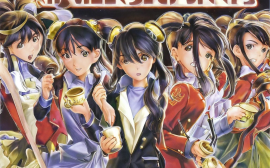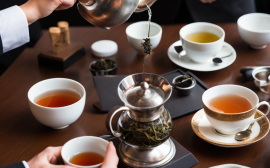Brewing Success: How Premium Tea Education Elevates Retail Performance
In the fiercely competitive landscape of modern retail, providing exceptional customer experiences is paramount to success. This is particularly true for tea retailers, where the product itself is steeped in tradition, nuance, and a rich cultural history. Merely selling tea is no longer sufficient; it requires cultivating a culture of knowledge and passion that elevates the entire tea-buying journey, transforming a transactional exchange into an immersive and educational experience. Investing in premium tea education for retail staff is a strategic move that yields substantial returns, impacting everything from customer satisfaction and brand loyalty to sales performance and overall profitability. Tea education empowers retail staff to become brand ambassadors, capable of articulating the unique qualities of each tea and guiding customers towards selections that perfectly match their palates and preferences. This personalized approach fosters deeper customer connections and cultivates lasting loyalty. For example, a well-trained staff member can explain the distinct flavor profiles of various green teas, highlighting the subtle vegetal notes of a Japanese Sencha versus the delicate sweetness of a Chinese Dragon Well. This level of expertise enhances the customer experience and positions the retailer as a trusted source of knowledge within the tea industry. Furthermore, tea education programs provide retail staff with the tools to effectively upsell and cross-sell, boosting average transaction value and driving revenue growth. By understanding the nuances of tea pairings, staff can recommend complementary products like teaware, pastries, or even specific brewing equipment, maximizing sales potential and contributing directly to ROI. In today’s experience-driven economy, investing in staff development through tea education is not just a cost, but rather a strategic investment in the long-term success of the business. A knowledgeable team fosters customer trust, elevates the brand image, and ultimately drives sales growth. This commitment to tea education demonstrates a dedication to quality and expertise, resonating with discerning tea consumers who seek more than just a product; they seek an experience. Consider a customer inquiring about a black tea for afternoon tea. A trained staff member can not only recommend a classic Assam but also explain its brisk character, malty notes, and suitability for pairing with milk and sugar. This expert guidance transforms a simple purchase into an educational opportunity, fostering customer engagement and strengthening their connection with the brand. Moreover, tea education initiatives can be tailored to address specific business objectives, whether it’s enhancing customer service skills, increasing product knowledge, or improving sales techniques. These programs can be delivered through various methods, including online modules, in-person workshops, and interactive tasting sessions, ensuring flexibility and accessibility for all staff members. By aligning tea education with strategic business goals, retailers can maximize the impact of these programs and achieve measurable results. Finally, investing in premium tea education is a key differentiator in the competitive tea retail market. It sets a brand apart by showcasing its commitment to quality, expertise, and customer-centricity. In a world where consumers are increasingly seeking authentic and enriching experiences, tea education empowers retailers to deliver exceptional value and cultivate lasting relationships with their customers.
The Value Proposition of Tea Knowledge
A deep understanding of tea empowers retail staff to engage customers on a more meaningful level, transforming transactions into personalized experiences. Knowledgeable staff can guide customers through the nuances of different tea types, from the delicate floral notes of a white tea to the robust earthiness of a pu-erh, fostering a sense of discovery and appreciation. By understanding the origins of different teas, staff can share captivating stories of terroir and tradition, enriching the customer’s understanding and connection with the product. This personalized approach builds trust and rapport, encouraging customers to explore new varieties and ultimately increasing sales. For example, a customer initially interested in a basic black tea might be guided towards a premium Darjeeling after learning about its unique muscatel flavor profile, demonstrating how tea education directly translates into higher average transaction values. This elevated customer experience fosters loyalty and repeat business, crucial metrics for long-term success in the competitive tea industry. Effective tea education programs equip retail staff with the knowledge to address customer inquiries confidently and accurately. This expertise builds customer confidence and positions the retailer as a trusted source of information, enhancing brand credibility and fostering customer loyalty. For instance, a staff member who can articulate the differences in processing methods between green and oolong teas, explaining the impact on flavor and aroma, not only educates the customer but also solidifies their trust in the retailer’s expertise. This level of knowledge empowers staff to make informed recommendations tailored to individual preferences, further enhancing the customer experience and driving sales. Moreover, well-trained staff can leverage their tea knowledge to create upselling and cross-selling opportunities. By understanding the complementary nature of certain teas and food pairings, staff can suggest additional purchases that enhance the customer’s overall tea experience. For example, a customer purchasing a Japanese sencha might be introduced to a traditional matcha whisk and bowl, or a customer buying a robust Assam tea might be recommended a complementary dark chocolate. These strategic pairings not only increase sales but also deepen the customer’s engagement with the world of tea, further cultivating their appreciation and loyalty. Investing in tea education demonstrates a commitment to quality and expertise, differentiating a retailer in the competitive market. This investment translates into a superior customer experience, driving sales performance, brand loyalty, and ultimately, a strong return on investment. In today’s experience-driven economy, tea knowledge is not just a valuable asset; it’s a business imperative. By empowering retail staff with comprehensive tea education, retailers cultivate a culture of passion and expertise that elevates the entire tea-buying journey, brewing success from the ground up.
Effective Training Methodologies
Effective tea education programs leverage diverse methodologies to cultivate a skilled and knowledgeable retail team. Sensory evaluation training, a cornerstone of tea education, refines palate acuity by teaching staff to discern subtle nuances in aroma, flavor, and texture. This allows them to articulate tea profiles effectively to customers, guiding their selection process and enhancing their appreciation. Practical brewing demonstrations provide hands-on experience with various brewing methods, from traditional Gongfu techniques to modern cold-brew infusions. Mastering these techniques ensures consistent tea preparation, maximizing flavor and delivering a premium customer experience. Customer interaction best practices equip staff with the skills to engage customers effectively, build rapport, and personalize recommendations based on individual preferences. This fosters customer loyalty and drives sales performance. Online learning platforms offer flexibility and accessibility, allowing staff to learn at their own pace and revisit modules as needed. This is particularly beneficial for geographically dispersed teams or those with varying schedules. In-person workshops provide immersive, hands-on experiences that facilitate deeper learning and foster team building. These interactive sessions allow for real-time feedback, sensory exploration, and the development of practical skills. Blended learning approaches, combining online modules with in-person sessions, offer a comprehensive and engaging learning journey. This hybrid approach leverages the strengths of both formats, maximizing knowledge retention and skill development. For instance, online modules can cover tea history, origins, and processing methods, while in-person sessions focus on sensory evaluation and brewing techniques. Tea education programs should also incorporate modules on tea and food pairing, enabling staff to offer well-informed recommendations and enhance the customer experience. This knowledge expands sales opportunities by encouraging customers to explore complementary products. Moreover, training programs must address inventory management, storage best practices, and tea handling procedures to ensure product quality and minimize waste. This operational knowledge contributes to overall business efficiency and profitability. By investing in comprehensive tea education, retailers equip their staff with the knowledge and skills to elevate the customer experience, drive sales, and foster brand loyalty within the competitive tea industry. This strategic investment translates into tangible ROI through increased average transaction value, improved customer retention, and enhanced brand reputation.
Measuring Impact and ROI
Measuring the impact of tea education programs is crucial for demonstrating ROI and justifying the investment in staff development. This process goes beyond simply tracking sales figures and delves into understanding the multifaceted ways in which tea education influences customer behavior, brand perception, and ultimately, the bottom line. Key metrics include tracking sales performance before and after training implementation, providing a clear quantifiable measure of the training’s effectiveness. For example, a tea retailer might see a 15% increase in average transaction value after implementing a tea education program, directly attributable to staff’s enhanced ability to upsell and cross-sell premium teas. Monitoring customer satisfaction scores through surveys and feedback forms offers valuable insights into the customer experience. Positive feedback regarding staff knowledge and helpfulness directly correlates with the quality of the tea education program. Analyzing brand loyalty metrics, such as repeat purchase rates and customer lifetime value, provides a long-term perspective on the impact of tea education. Educated staff foster stronger customer relationships, leading to increased customer retention and higher lifetime value. By quantifying these results, retailers can clearly demonstrate the positive impact of tea education on their bottom line and build a strong case for continued investment in staff training. Tea education empowers retail staff to become brand ambassadors, capable of articulating the value proposition of premium teas and cultivating a loyal customer base. This translates into tangible business outcomes, including increased sales, improved customer satisfaction, and enhanced brand reputation within the competitive tea industry. Moreover, tracking specific product performance post-training can reveal valuable insights. For instance, if sales of a particular region’s teas increase after a training session focused on that region, it demonstrates the effectiveness of the program in educating staff and influencing customer purchasing decisions. This granular level of analysis allows retailers to refine their training programs and focus on areas that yield the highest ROI. Furthermore, incorporating customer feedback into the training evaluation process is essential. Gathering qualitative data through surveys and feedback forms allows retailers to understand how tea education impacts the customer experience from the customer’s perspective. This data can then be used to further refine training content and delivery methods, ensuring that the program remains aligned with customer needs and expectations. In the tea industry, knowledgeable staff are a key differentiator. By investing in comprehensive tea education, retailers not only enhance their staff’s expertise but also create a unique and valuable customer experience that fosters loyalty and drives business growth. This investment in human capital is a strategic move that positions tea retailers for long-term success in a dynamic and evolving market.
Showcasing Success Stories
The transformative impact of comprehensive tea education programs on retail performance is evident in the success stories of numerous tea retailers. These businesses, recognizing the value of a knowledgeable staff, have invested in training programs and witnessed significant improvements in key performance indicators. For example, a specialty tea shop in San Francisco reported a 20% increase in average transaction value within six months of implementing a staff training initiative focused on tea origins, brewing techniques, and customer service. This improvement can be attributed to the staff’s enhanced ability to guide customers toward higher-quality teas and provide personalized recommendations, ultimately increasing sales. Similarly, a national tea retailer saw a 15% boost in customer retention after launching an online tea education platform for its employees. This platform provided accessible and engaging training modules on tea types, flavor profiles, and brewing methods, empowering staff to deliver exceptional customer experiences that fostered loyalty. These real-world examples underscore the potential of tea education to drive business growth and enhance customer satisfaction. Investing in tea education not only equips retail staff with the knowledge to sell tea effectively but also cultivates a culture of passion and expertise that resonates with customers. When staff members can articulate the nuances of different tea types, explain the art of brewing, and share captivating stories about tea origins, they create a truly immersive and enriching experience for customers. This heightened level of engagement translates into increased sales, improved customer loyalty, and a stronger brand reputation within the competitive tea industry. Moreover, tea education programs contribute to a more motivated and engaged workforce. By providing opportunities for professional development and skill enhancement, retailers demonstrate a commitment to their employees’ growth, leading to increased job satisfaction and reduced staff turnover. This positive impact on employee morale further strengthens the overall customer experience, as enthusiastic and knowledgeable staff members are more likely to provide exceptional service. Tea education also empowers retail staff to become brand ambassadors, effectively communicating the value proposition of premium teas to customers. They can confidently articulate the unique characteristics of different tea varieties, highlight the health benefits associated with tea consumption, and guide customers toward making informed purchasing decisions. This expertise builds trust and credibility, fostering stronger customer relationships and ultimately driving sales growth. Furthermore, a well-trained staff can leverage their tea knowledge to create innovative tea-related experiences, such as in-store tasting events, tea pairing workshops, and educational seminars. These events not only attract new customers but also provide opportunities to upsell and cross-sell tea products, enhancing profitability. By investing in tea education, retailers are not merely training employees; they are cultivating a team of passionate tea experts who can elevate the customer experience and drive business success in the dynamic tea industry.
Building a Tea-Savvy Team
Cultivating a team of tea experts is an investment that yields substantial returns in the competitive retail landscape. It begins with a commitment to ongoing learning and development, transforming retail staff into passionate brand ambassadors who elevate the customer experience and drive sales. Recruiting individuals with a pre-existing interest in tea is a crucial first step. These individuals possess an inherent curiosity and enthusiasm that forms a strong foundation for tea expertise. Providing them with comprehensive initial training that covers the basics of tea types, origins, processing methods, and brewing techniques is essential. This foundational knowledge equips them to confidently engage with customers and provide informed recommendations. Beyond initial training, implementing a system for continuous learning is vital for maintaining staff expertise and keeping them abreast of evolving industry trends. Regular workshops, online modules, and mentorship opportunities provide avenues for continuous skill development. For instance, sensory evaluation training refines palate acuity, enabling staff to articulate flavor profiles and guide customer selections with greater precision. Practical brewing demonstrations enhance their ability to prepare tea flawlessly, showcasing best practices to customers. Furthermore, training in customer interaction best practices empowers staff to build rapport, understand customer preferences, and provide personalized recommendations that enhance the overall tea-buying experience. Tea certifications, offered by reputable organizations like the Specialty Tea Institute, provide staff with recognized credentials that validate their expertise and build customer trust. Encouraging staff to pursue these certifications demonstrates a commitment to professional development and reinforces the retailer’s dedication to tea excellence. By fostering a culture of continuous learning and professional growth, tea retailers empower their staff to become true tea connoisseurs. Investing in staff education not only enhances their knowledge and skills but also boosts their confidence and job satisfaction. This translates into a more engaged and motivated team, better equipped to deliver exceptional customer experiences. A well-trained team can educate customers about the nuances of different teas, guiding their exploration of various flavor profiles and brewing methods. This personalized approach fosters a deeper appreciation for tea and cultivates stronger customer loyalty. Moreover, knowledgeable staff can effectively upsell and cross-sell tea products, increasing average transaction value and driving revenue growth. The return on investment in tea education extends beyond immediate sales gains. By creating a team of passionate and knowledgeable tea ambassadors, retailers enhance their brand image, build stronger customer relationships, and solidify their position as trusted sources of tea expertise. This creates a sustainable competitive advantage in a market where informed consumers increasingly seek authentic and enriching tea experiences. In essence, a tea-savvy team is not merely a sales force; it is a collective of passionate individuals who share their love of tea with customers, fostering a vibrant community around this beloved beverage. This shared passion elevates the retail experience from a transaction to a journey of discovery, enriching the lives of both customers and staff alike.



